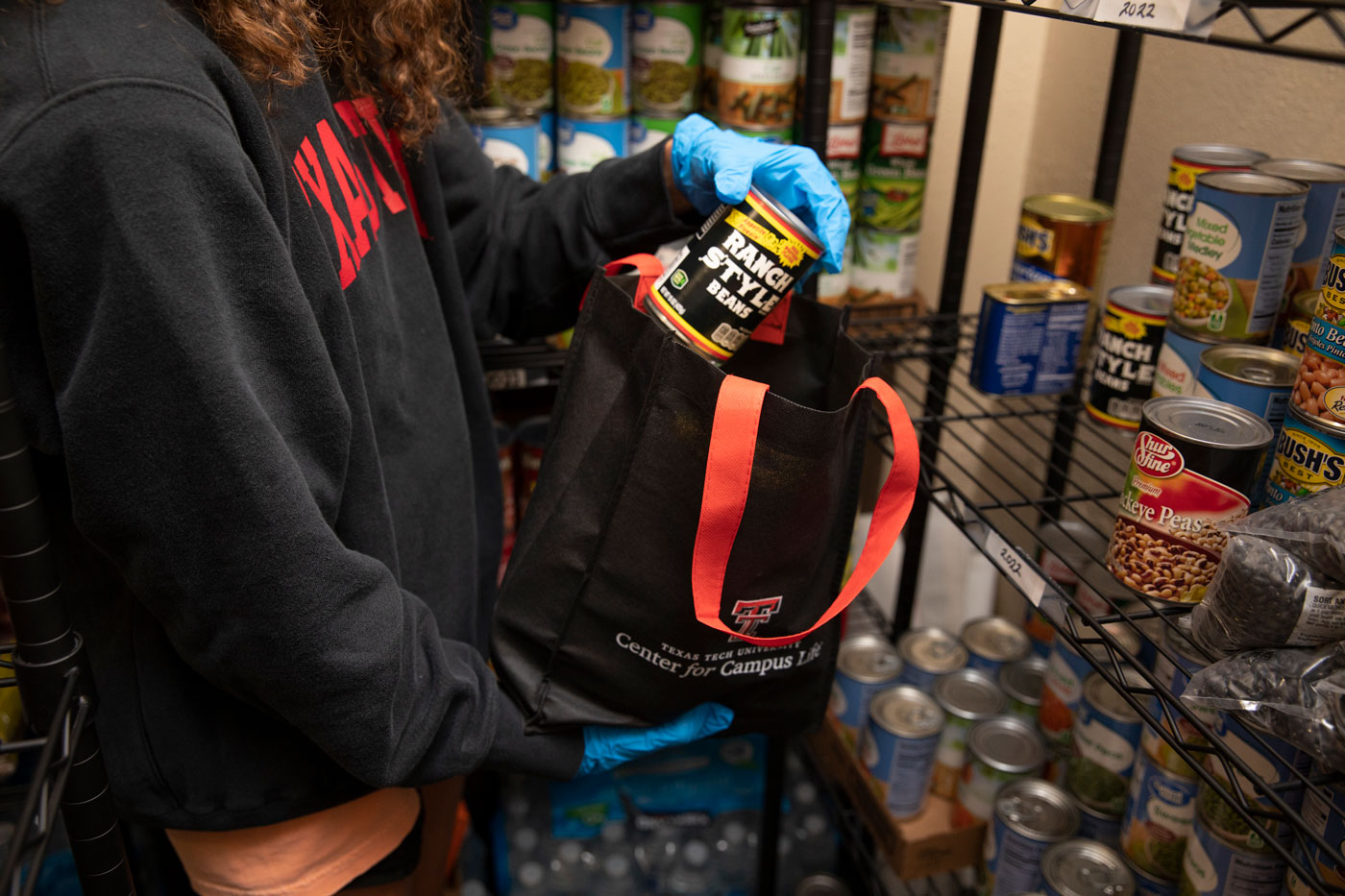Texas Tech has a variety of services that can help students navigate sudden, unexpected crises in their lives.
(This story is part of a series looking at examples of innovation on the Texas Tech campus. This installment looks at The Raider Relief – Advocacy and Resource Center.)
It wasn’t all that long ago words like “food insecurity” and “homelessness” would rarely if ever populate a list associated with the Texas Tech University student experience.
That was then. This is now.
“Students cannot be successful in the classroom if they’re hungry or if they don’t have a place to live or if something is happening with their family that is causing them some distress,” said Elizabeth Massengale, assistant vice provost for student support and success. “Solutions require a more holistic approach beyond the academic focus because so many things in life can impact a student and their success.”
Over the years, Texas Tech has worked diligently to establish an interconnected web of resources to ensure students have access to life preservers when unexpected tidal waves of circumstance threaten to capsize their world. Sometimes students find themselves having to choose among paying rent, buying food or purchasing textbooks.
The portrait of a carefree college student with money to burn is at best inaccurate and at worst a harmful stereotype. Today, students balance numerous demanding costs, and often it only takes one surprise expense to knock everything off kilter. Consequently, associated statistics are equal parts alarming and sobering.
“Approximately 30% of college-level student populations are food insecure at some point,” Massengale said. “That figure is not unique to Texas Tech; that’s a general number across college campuses. We don’t have numbers that are as accurate for homelessness, but 10% to 15% is not uncommon.”
Homelessness occurs when students do not have a stable, permanent residence. Some students also deal with housing insecurity, which takes place when their living situation is tentative (think of so-called “couch surfing” at homes of friends). Similarly, food insecurity is when students do not have access to sufficient food of adequate quality to meet their basic needs.
“Some things are out of their control,” Massengale said of the variety of circumstances that can suddenly destabilize a student’s life. “Unless you work in education, you probably don’t realize how many different difficult things happen to students that you can just never fathom. It is literally all over the place.”
Over the years, Texas Tech has established a handful of programs intended to assist students during a crisis. These outreach initiatives include Raider Relief Fund and Raider Red’s Food Pantry and Red to Black Peer Financial Coaching.
The important thing is the programs are all now housed under the umbrella of The Raider Relief – Advocacy and Resource Center. It was developed to support student needs and connect them with essential resources necessary for academic success as a Texas Tech student. It includes (but is not limited to) five primary focus areas: food, housing, financial education & support, employment, and academic supply support resources.
“The overarching idea is to respond to students when they reach out to us saying they need help,” Massengale said. “Maybe they are having trouble finding a job or need help identifying childcare or support with food or a transportation need. It is a whole gamut of things, and we’re approaching it through more of a social work lens.”
The programs also employ students whose education aligns with the service area, allowing them to gain practical experience beyond the classroom.
“It is experiential learning for them, so it’s also good in that regard,” Massengale said. “We’re not only serving our student population but giving students who will work in that area hands-on experience.”
Assistance Programs Include Guidelines
The initiatives include guidelines, processes and protocols to ensure that resources are allocated effectively and efficiently.
For example, money from the Raider Relief Fund, which can trace its origins back to 2009 and was previously housed in the office of the Dean of Students, can be used only for emergency funding needs like rent, food, utilities and textbooks. An application must be submitted, which is then reviewed by a committee that oversees the fund. Students are limited to a total of $1,000 in relief funds during their time at Texas Tech.
“Students have to submit some financial documentation as well as the invoice or statement of what they are asking our help with to pay,” Massengale said. “We only pay off-campus expenses, and we have a committee that reviews and approves applications.
“The relief fund is meant to be a short-term solution. That is where other services may need to come in, so if a student has reached that maximum, then we need to have a different conversation to connect the student with resources on or off campus to help support them long term.”
Similar guidelines are in place for Raider Red’s Food Pantry. Founded in 2017 and originally under the purview of Student Life, the food pantry is located in Doak Hall Room 117. The 500-square-foot facility packs an amazing wallop into its relatively tiny space, regularly serving more than 1,000 students per semester, and now operating at near capacity in terms of volume.

“We try to limit students to using the food pantry three times during the semester,” she said. “After their second visit, we follow up with them to see if they have long-term needs and if we can connect them elsewhere. Certainly, if they need access beyond three times, we let them.”
The pantry benefits from donations, and people can help reinvigorate its supplies in several ways: ordering from the facility’s wish list on Amazon, donating directly or hosting a food drive and subsequently delivering items to the pantry.
“We receive a lot of referrals from people on campus who are aware of the service and trying to connect someone with support,” Massengale said. “We have to work really hard to balance what we allocate against the needs in the most responsible way possible. That’s why we have limitations in place.”
Not a One-Size-Fits-All Approach
The Red to Black Peer Financial Coaching program originally was established in 2000 and is in place to connect students with sound financial practices, walking them through important issues like creating and sticking to a budget, applying for a credit card and understanding the ins and outs of student loans.
In addition to meeting student needs on campus, Texas Tech has worked to build partnerships with a wide variety of social service organizations across Lubbock so that when a long-term solution is required, a connection is already in place.
“We have spent a lot of time identifying community resources,” Massengale said. “Examples of these resources include the South Plains Food Bank, the Parenting Cottage and the Salvation Army. All of these community resources can assist in supporting students with needs such as long-term food insecurity, parenting and children needs, housing, and financial support.”

Along those lines, University Student Housing often has been instrumental in providing options for students dealing with an insecure residential situation.
“Sometimes students are just in between places,” she said, “and they need a place for a couple of weeks. We’ve been fortunate to work with University Housing on both short- and long-term needs.”
Other off-campus organizations that have assisted students include Catholic Charities Diocese of Lubbock and the South Plains Food Bank.
“We are establishing relationships with a number of organizations to enable a warm handoff to those agencies, when necessary,” she said. “Some of them have so much volume that it is helpful for us to make that initial connection for the student.”
When students run into unexpected adversity, the idea is to find a quick solution for the near term and then, when necessary, connect them to organizations with specific expertise to address the need.
“We want to connect students first on campus to get some type of short-term care in place,” Massengale said. “Then we can work on figuring out the long term, and you go from there because there can be all sorts of nuances that you have to think through.”
As Texas Tech continues to grow and its student population continues to expand, Massengale is certain of one thing – need will be a steady companion.
“The more students you have and the different backgrounds and experiences they bring to the campus, some of them will experience things in a dramatic, negatively impactful way,” she said. “If you were to talk to a community service agency, they would tell you the same thing. The need is great, and we have awareness around the need, so we also have the opportunity to do something about it.”
To help Texas Tech respond to even more needs, click here to make a gift this Giving Tuesday.

